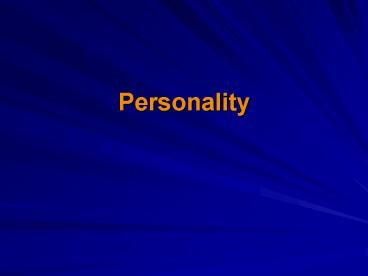Personality - PowerPoint PPT Presentation
1 / 35
Title:
Personality
Description:
How are we different from each other? What theories best explain ... Psychodynamic. Humanistic. Cognitive/learning. Trait. Self. Freud's Psychoanalytic. Theory ... – PowerPoint PPT presentation
Number of Views:133
Avg rating:3.0/5.0
Title: Personality
1
Personality
2
Individual Differences
- Emotional Intelligence
- Perception
- Use
- Understanding
- Management
3
Today
- How are we different from each other?
- What theories best explain these differences?
- What are the consequences of these differences?
4
Personality
- Typical uses
- He has a good personality
- Social skills and likeability
- She has a lot of personality
- Social impact
- He has a neurotic personality
- Strongest quality
5
Personality Definition
- Non-technical definition of personality
- A persons general style of thinking, feeling,
and behaving - Technical definition
- Personality is the system of enduring, inner
characteristics of individuals that contributes
to consistency in their thoughts, feelings, and
behavior (Leary, 2005).
6
Personality Definition
- Consistency
- Enduring
- Inner
7
Fundamental Ideas
- Each of us is unique
- We are not unique in random ways
- That thread of consistency within each of us is
our personality
8
Major Theories
- Psychodynamic
- Humanistic
- Cognitive/learning
- Trait
- Self
9
Freuds Psychoanalytic Theory
10
Freud and the Unconscious
11
Psychoanalytic Defense Mechanisms
- Displacement
- Denial
- Intellectualization
- Suppression
- Repression
12
A Few Examples
- Bobby Knight
- Tims experience with alcohol
- Senator Larry Craig
13
Psychoanalytic Defense Mechanisms
- Defense mechanisms
- Unhealthy
- Require energy
- Avoid real problem
14
Freudian Slips
- Freudian Slips
- "A Freudian slip is like saying one thing, but
meaning your mother." - People of Detroit
15
Psychoanalysis
- Unearth hidden intrapsychic conflicts
- Free association dream analysis
- Long, time-consuming
- Little evidence for efficacy
- Case studies
- Untestable ideas
16
Humanistic Tradition
- Early-mid 20th century
- Carl Rogers
- Major Themes
- People are basically good
- Self-actualization
- Unconditional positive regard
17
Humanistic Tradition Comments
- Strengths
- Optimistic, positive
- Influential in parenting/psychotherapy
- Weaknesses
- Neglects unconscious
- Role of biology/genetics unclear
- Individual differences unclear
18
Cognitive Learning
- Cognitive learning theory
- Positive and negative reinforcement
- Emphasis on external environment
- Walter Mischel
- Albert Bandura
19
Cognitive Learning
- Cognitive
- Self-efficacy
- Expectancies and beliefs
- Affects (emotions, moods)
- Goals and values
- Interactions with situations
20
Cognitive Learning
- Strengths
- Can predict differences across situations
- Explains origins of personality
- Weaknesses
- Nonemotional
- May ignore unconscious
- Role of biology/genetics unclear
21
The Trait Paradigm
- Focuses on how people differ from each other
- Lexical hypothesis
- All important traits must have been encoded in
language (Gordon Allport)
22
Stability
- Stable attributes of personality (trait vs. state)
23
Traits
Easy-going
Intellectual
Loving
Talkative
Timid
Arrogant
Calm
Kind
Dominant
Conservative
Aloof
Shy
Friendly
Impulsive
Reserved
Cheerful
Grouchy
Nice
Fearless
Diligent
Curious
Confident
Agreeable
Reserved
Irritable
Affectionate
Calm
Jumpy
Anxious
- English - 2,800 trait terms
24
Big Five Dimensions of Personality
- Openness to new experiences
- Conscientiousness
- Extraversion
- Agreeableness
- Neuroticism
OCEAN
25
Openness - imaginative, with wide interests
- I often try new and foreign foods
- I often enjoy playing with theories or abstract
ideas - Predicts desire for challenges, frequency of
changing jobs
26
Conscientiousness - organized, thorough
- I strive for excellence in everything I do
- I am a productive person who always gets the job
done - Predicts job performance (Ones, 1993), grades,
educational attainment, low use of alcohol
(Paunonen, 2003)
27
Extraversion - talkative, energetic, assertive
- I like to have a lot of people around me
- I laugh easily
- I like to be where the action is
- Predicts positive emotions (Watson et al., 2002),
dating frequency, exercise, partying, alcohol
intake (Paunonen, 2003)
28
Agreeableness - sympathetic, kind
- I try to be courteous to everyone I meet
- I would rather cooperate with others than compete
with them - Predicts positive emotions (DeNeve Cooper,
1998), low stress (Rantanen at e., 2005),
perceived support (Branje et al., 2004)
29
Neuroticism - tense, anxious, moody
- When Im under a great deal of stress, sometimes
I feel like Im going to pieces - I often feel tense and jittery
- Associated with anxiety, depression, physical
illness (McCrae Costa, 1991)
30
Limitations
- Is this all there is to personality?
- What about
- Motives, wishes, desires, fears, unconscious
processes? - Origins?
31
Traits Heritability
- Twin studies
- Identical vs. fraternal twins
32
Heritability of personality
33
Do traits predict behavior?
- Crisis!
R .30
PERSONALITY
BEHAVIOR
34
Situationist Argument
- Personality traits are limited in their ability
to predict behavior - Situations influence behavior more than
personality traits - Personality assessment has limited use
35
Pro-Personality Argument
- Different people behave differently in the same
situation - Each person behaves somewhat similarly across
situations. - Traits predict trends rather than specific
behaviors - Situational influence on behavior is equally
modest (hard to measure) - Strong and weak situations































